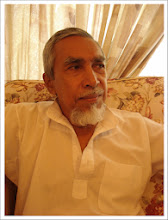1. In January 1916 about five years after joining the Kedah Civil
Service, my father was appointed to sit on the
Enactment Translation Committee. Thus began his involvement in the translation
of Enactments etc. Later in September 1918, he was appointed a committee member
for the drawing up of laws for the State of Kedah. His role was highlighted in a newspaper article. The writer wrote inter
alia:
… He [M.I. Merican] is the soul of the Translation Committee and is really the translator of the English version into Malay. His work is not paste and scissors but putting every English word in the laws into intelligible Malay.
(The Straits Times, 16 August 1935, Page 17.)
2. The year 1922 opened a new chapter in my
father’s career. In October he was appointed to the
post of Assistant Superintendent Monopolies and Customs in Sungai Petani. Incidentally, just before being transferred to
the town 54 kilometers away, he was appointed to carry
out the work of special Translator of Enactments etc.
3. Thus the State
Council decided as a temporary expediency that he should be called upon to
assist in translation work in addition to his other duties and should receive a
fee for so doing. Apparently he started doing the work of
translating the Enactments when he was in Sungai Petani. His earliest work was
probably the translation of the Arms Enactment, the Customs Enactment and the
Arbitration Enactment. These were completed in December 1922 for which he was
remunerated a sum of $100 rial.
4. Subsequently other translations
followed. In a letter to the Under Secretary dated 29 April, 1923, he acknowledged receipt of an instruction ordering
him to translate the Amendment (Criminal Procedure Code). He informed that he
was then “translating the Pensions Enactment and Police Pensions Enactment, and
Regulations made there under.” He further explained about the problem he was
facing:
… They [the aforementioned Enactments] are difficult in regard to the legal phraseology and pretty long too. I shall take up the “Procedure” after finishing the Pensions Enactments and their Regulations. I am afraid the “Code” which is rather [long?] will take some time to finish.2. My hands are full on account of the “Restriction” in relation to the Customs and I do out-door work in nature of inspecting outstations. This will handicap in expediting the translations to a decree [degree?]. I will c[arry?] on as much as I possibly can to do both.3. I have translated the following for which I have not been remunerated:-(i) The vehicles Enactment l334, Amendment Enactment 1341.(ii) The Maintenance of wives and children Enactment 1341.(iii) The Performances Enactment.(a) Rules in relation to Musical and Theatrical Performances.(b) Rules re conduct of Cock-fighting pits.(c) Rules in relation to Bull and Buffalo Fighting.(iv) The Cock-fighting and the Bull-fighting Enactment.
5. In a related letter to the Under Secretary dated 28 May, 1923 he restated of having translated
the aforementioned Enactments including the Amendment Enactment (Criminal Procedure
Code). He mentioned that the latter “had been a difficult job and done
expeditiously.” He concluded with a request for a suitable remuneration for his
work. The Government paid him $90 rial.
6. Less than two months later, he had
translated another eight Enactments and Rules. In a related letter to the Under
Secretary dated 4 July, 1923, he listed the Enactments and Rules as follows:
(i) “Export of Rubber (Restriction) Enactment,
l34l”.
(ii) Rules under “The Export of Rubber
(Restriction) Enactment, 134l”.
(iii) Pensions Enactment 1341”.
(iv) Regulations under “The Pensions Enactment,
1341”.
(v) “Police Pensions Enactment, 1341”.
(vi) Rules under “The Police Pensions
Enactment, 1341”.
(vii) Forest Amendment Enactment, l34l.
(viii) Instructions to Magistrates etc.
re-Inquiries of death.”
He also included remarks about his work in the
letter:
With the exception of (vii) all have entailed upon me much mental and physical energy in view of the fact that they were pretty long and were required hurriedly. With regard to (i) (ii) and (viii) they were done very expeditiously owing to their urgent condition. I must request that Govt. will make a special allowance for such hard work.
Note: Mine in square brackets.










